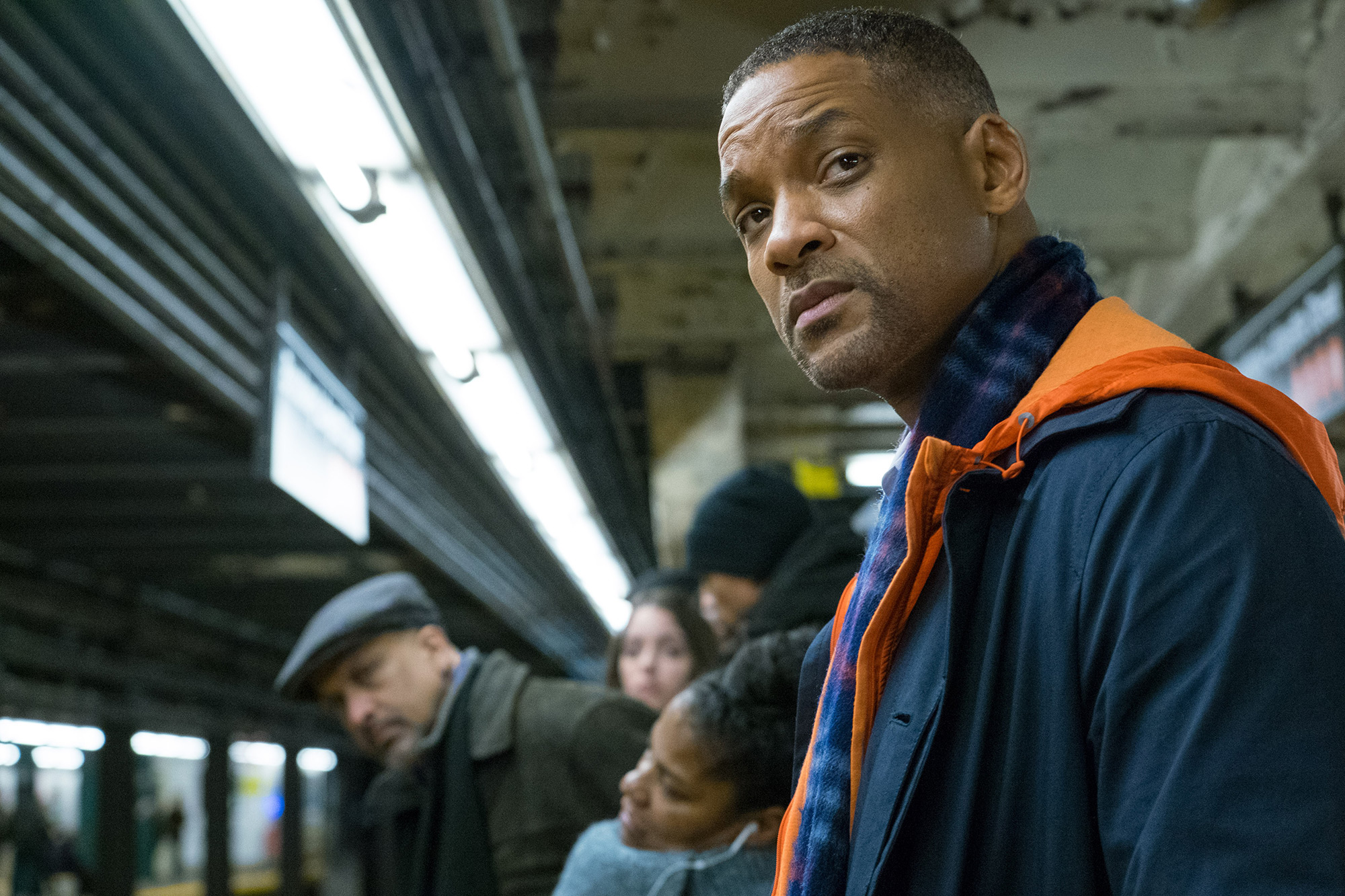“Collateral Beauty” is a specific kind of tearjerker, one where pretty people walk around looking gloomy, characters develop through overstated monologues or on-the-nose visual metaphors, snow always falls delicately over a prominently displayed New York City, and everyone gets a good cry before the curtains rise. On-screen, at least. Manipulative and over-engineered, starring high-profile actors doing all they can elicit deep compassion, “Collateral Beauty” fails to make an impression, and contains not nearly enough authentic beauty to make it worthwhile.
READ MORE: The 25 Best Films Of 2016
Howard Inlet (Will Smith), a successful executive running an advertising firm, lives his life following three abstractions: love, death and time. Together, these three universal, metaphysical conceptions help us find our answer to the question, “What is our why?” But when Howard’s six-year-old daughter tragically passes away, Howard is left in a perpetual disillusioned funk, unable to find meaning or value in anything. He rides his bike straight into traffic. He doesn’t eat most days. He handwrites spiteful letters to Love, Death and Time, asking them why they betrayed him so viciously. This is Howard’s mindset for two years, and it has caused great concern regarding his company’s stability. His employees and friends Claire (Kate Winslet), Whit (Edward Norton) and Simon (Michael Peña) are not only worried about their boss’ mental health, but their own professional futures. Moreover, they need his signature on the paperwork to secure a buyout that will save the company. They need a plan. Quick. And that’s where struggling actors Amy (Keira Knightley), Brigitte (Helen Mirren) and Raffi (Jacob Latimore) come into play, both literally and figuratively.

Talented, but undervalued and underseen, Brigitte, Raffi and specifically Amy attract Whit’s attention one day, which inspires him to use their thespian skills to their mutual benefit. Having retrieved a series of Howard’s damning letters to Love, Death and Time from a private investigator (Ann Dowd), the ad executives hope the three actors will take on these three different ideologies, meeting and speaking with Howard individually, only to later prove, via doctored street footage, that Howard is irrationally unstable and mentally incapacitated to his investors — as if the riding-bikes-into-traffic thing wasn’t telling enough on its own. This’ll promote a huge cash settlement for Howard’s company, and the three soon-to-be-former employees will pay each actor $20,000 to assume their respective parts. They all agree, with Brigitte personifying Death, Raffi embodying Time and Amy begrudgingly becoming Love. The work is among their most fulfilling, refreshing performances to date, but is it enough to stabilize Howard and offer some much-needed closure? Maybe, but he might need some extra comfort from a local grieving supporting group, run lovingly by the sweet, understanding Madeline (Naomie Harris).
“Collateral Beauty” comes from director David Frankel, the filmmaker behind “Marley & Me,” “Hope Springs,” “The Big Year” and “The Devil Wears Prada.” He knows how to make a safe, largely toothless (and often mediocre) movies. But given the story “Collateral Beauty” is trying to tell about grief and loss, it’s lacking necessary vitality and raw emotion. When placed against the heartbreakingly cathartic “Manchester By The Sea” and the fantastically melancholy “A Monster Calls,” the film’s lack of resonance stands out all the more. It also doesn’t help that it comes from Allan Loeb, the screenwriter/producer known for his middling (at best) pen behind pictures like “The Dilemma,” “Wall Street: Money Never Sleeps,” “21,” “The Switch” and “Here Comes The Boom.” “Collateral Beauty” wants to be deep. Characters talk about their purpose in life in nearly every single scene, and one even stops to explain the film’s title. But it’s often as brooding, pensive and “profound” as a sophomore philosophy major, and it only insists upon itself more from there. It’s not so much grating as trite. Nothing said is as revolutionary as it thinks, but it still wants you to stop and, like, really soak it in, man.

Above all else, however, “Collateral Beauty” is an actor’s showcase, and with an ensemble as talented as this one, you don’t have any shortage on dramatics. None of them are terrible per se, but only a few get enough opportunities to rise above the screenplay. Mirren is always a charming screen presence, and she shines more than she doesn’t here. Peña, similarly, is often the most grounded and reserved of the ensemble, Latimore is down-to-earth in a film that’s often not, and Knightley certainly knows how to spark the waterworks like her life depends on it. But Winslet and Norton, while certainly not bad, give noticeably inferior performances, and Harris isn’t given nearly enough time to shine. And for better or worse, they’re all playing second fiddle to Smith.
The actor tries as he might to make this movie hit home, bless his heart. Pink-eyed, mopey and divorced from his usual charismatic stride, Smith is decidedly more “Seven Pounds” here than, say, “I Am Legend,” “The Pursuit Of Happyness,” “Concussion” or even “Suicide Squad.” It’s a tender, contemplative, sometimes aching performance stuffed inside a rudimentary, workmanlike movie, and in the right few moments, Smith provides a genuinely moving turn, and Frankel, if nothing else, knows how to make emotions explode during the climax. The A-list actor almost makes it work, but he’s often blockaded by the movie’s overbearing, often downright incessant need to provoke as many emotions as possible from the audience, authentic or otherwise.
 “Collateral Beauty” isn’t nearly as superficial as it could’ve easily been, but it’s also largely forgettable. Bearing the marks of a manufactured Hollywood product, in a time when real feeling both inside and outside the multiplex is being widely shared, it makes this overwrought drama ring extra hollow. [C+]
“Collateral Beauty” isn’t nearly as superficial as it could’ve easily been, but it’s also largely forgettable. Bearing the marks of a manufactured Hollywood product, in a time when real feeling both inside and outside the multiplex is being widely shared, it makes this overwrought drama ring extra hollow. [C+]





